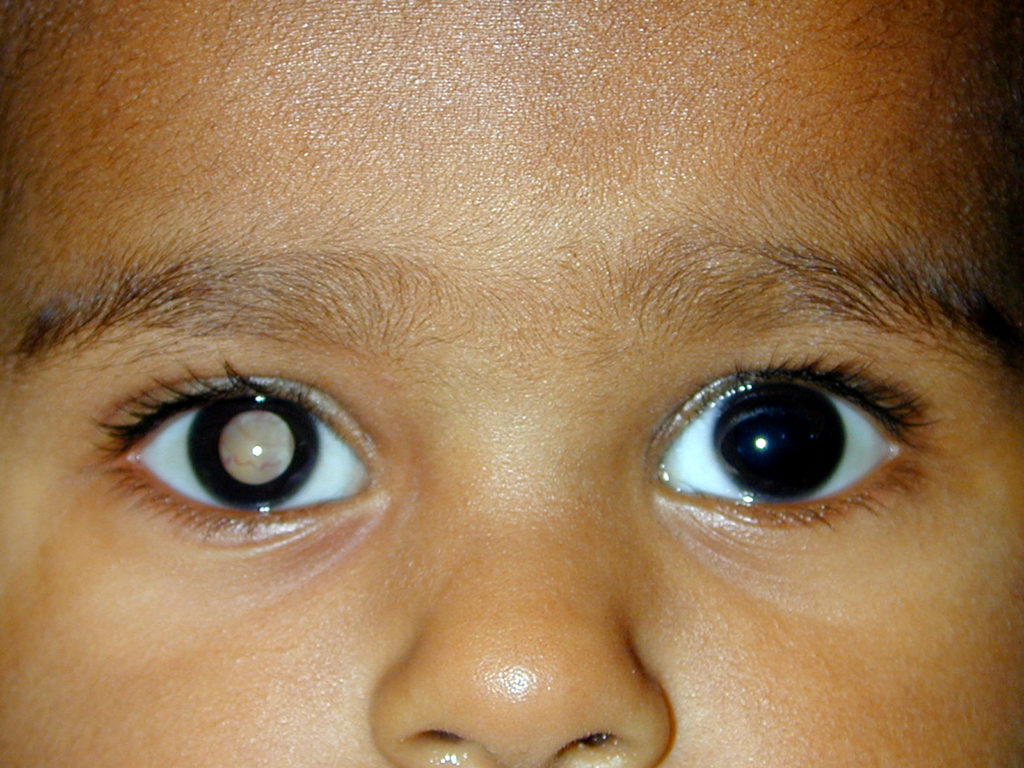
Overview
Retinoblastoma is a rare eye cancer that develops from the retina, the light-sensitive tissue at the back of the eye. It primarily affects young children, typically under the age of five, and can occur in one or both eyes.
It is often caused by a mutation in the RB1 gene, which may be inherited (hereditary) or occur spontaneously (non-hereditary). Early detection is crucial for preserving vision and life.
Symptoms
- White reflection in the pupil (leukocoria) seen in flash photos
- Crossed eyes (strabismus)
- Poor vision or loss of vision
- Eye redness or swelling
- Eye pain (less common)
Causes & Risk Factors
- Mutation in the RB1 tumor suppressor gene
- Hereditary retinoblastoma: often bilateral and diagnosed earlier
- Family history of retinoblastoma
- Non-hereditary cases usually affect one eye only
Diagnosis
- Dilated eye exam by a pediatric ophthalmologist
- Ultrasound of the eye
- MRI or CT scan to assess tumor spread
- Genetic testing to determine hereditary risk
Treatment Options
- Chemoreduction (systemic chemotherapy to shrink tumor)
- Focal therapies:
- Laser photocoagulation
- Cryotherapy
- Thermotherapy
- Intra-arterial chemotherapy
- Enucleation (removal of the eye, used for advanced cases)
- Radiation therapy (rarely used due to secondary cancer risk)
Prognosis
- Highly curable when detected early
- 5-year survival rate exceeds 95% in developed countries
- Vision preservation depends on tumor size, location, and number
Living with this Cancer Type
- Lifelong follow-up for recurrence and secondary cancers (especially in hereditary cases)
- Genetic counseling and screening for siblings or offspring
- Visual rehabilitation and prosthetic support (if eye is removed)
- Psychological support for child and family
Prevention & Screening
FAQs
- No prevention for spontaneous cases
- Genetic counseling for at-risk families
- Regular screening for children with family history
Resources
Q: Is retinoblastoma inherited?
A: In about 40% of cases. These patients may develop tumors in both eyes and have a higher risk of other cancers later in life.
Q: Can children survive retinoblastoma?
A: Yes, the survival rate is very high with timely treatment.
Q: Will a child lose vision?
A: It depends. Many children retain partial vision, and advanced cases may require eye removal.
Understand Precision Testing
Learn how liquid biopsy and chemo sensitivity testing can personalize your treatment plan.
Make Informed Decisions
Gain knowledge to actively participate in treatment discussions with your healthcare team.
Improve Treatment Outcomes
Discover how precision medicine and metabolic therapies can enhance treatment effectiveness.
Start Your Educational Journey Today
Empower yourself with knowledge about precision metabolic oncology and take an active role in your cancer care journey.
Need More Information?
Our team of oncology experts is here to help you understand your diagnosis and treatment options.
